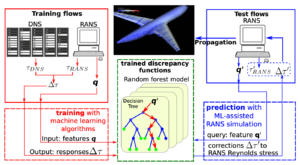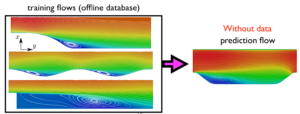-
Physics-informed machine learning (PIML) approach for predictive RANS modeling


- J.-X. Wang, J. Huang, L. Duan, H. Xiao. Prediction of Reynolds stresses in high-Mach-number turbulent boundary layers with physics-informed machine learning. Theoretical and Computational Fluid Dynamics, 33 (1), 1-19, 2019 [Arxiv, DOI, bib]
- X. Yang, S. Zafar, J.-X. Wang, X. Heng. Predictive large-eddy-simulation wall modeling via physics-informed neural network.Physical Review Fluids, 4 (3), 034602, 2019. [Arxiv, DOI, bib]
- J.-X. Wang, J.-L. Wu, and H. Xiao. A physics informed machine learning approach for reconstructing Reynolds stress modeling discrepancies based on DNS data. Physical Review Fluids. 2 (3), 034603, 1-22, 2017. [Arxiv, DOI, bib]
- J.-L. Wu, J.-X. Wang, H. Xiao, J. Ling. A Priori assessment of prediction confidence for data-driven turbulence modeling. Flow, Turbulence and Combustion. 99(1), 25-46, 2017. [Arxiv, DOI, bib]
- J.-X. Wang, J.-L. Wu, J. Ling, G. Iaccarino and H. Xiao. Towards a complete framework of physics-informed machine learning for predictive turbulence modeling. In Proceedings of the Center for Turbulence Research (CTR) Summer Program (Stanford University), 2016. [Arxiv, Link]
- J. Huang, L. Duan, J.-X. Wang, R. Sun and H. Xiao. High-Mach-number turbulence modeling using machine learning and direct numerical simulation database. In AIAA SciTech, 2017. [Arxiv, Link]
- H. Xiao, J.-L. Wu, J.-X. Wang, and E.G. Paterson. Physics-informed machine learning for predictive turbulence modeling: progress and perspectives. In AIAA SciTech, 2017. [Arxiv, Link]
- J.-L. Wu, J.-X. Wang, H. Xiao and E.G. Paterson, Visualization of high dimensional turbulence simulation data using t-SNE, In AIAA SciTech, 2017. [Arxiv, Link]
- J.-X. Wang, J.-L. Wu, J. Ling, G. Iaccarino, H. Xiao. A comprehensive physics-informed machine learning framework for predictive turbulence modeling, 2017. (Unpublished) [Arxiv]
-
Hybrid LES/RANS Simulations
- H. Xiao, J.-X. Wang and P. Jenny. Dynamic evaluation of mesh resolution and its application in hybrid LES/RANS methods. Flow, Turbulence and Combustion, 93(1), 141-170, 2014. [Arxiv, DOI, bib]
- H. Xiao, J.-X. Wang and P. Jenny. An Implicitly Consistent Formulation of a Dual-Mesh Hybrid LES/RANS Method. Communications in Computational Physics, 21(2) 2017. [Arxiv, DOI, bib]